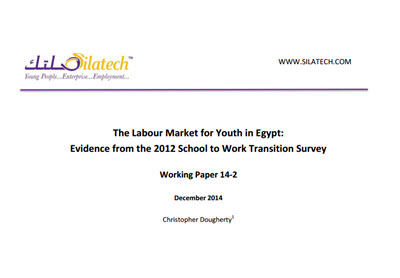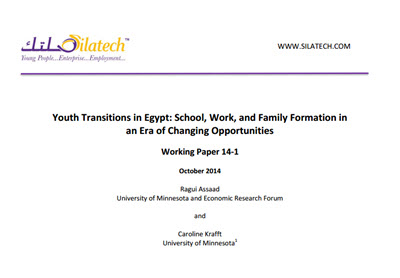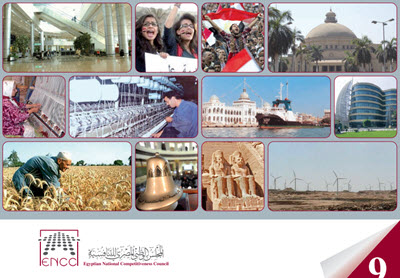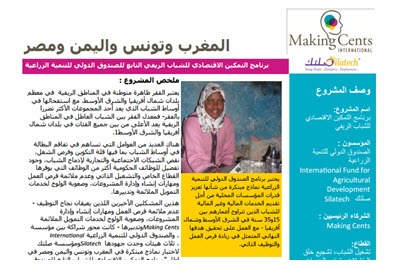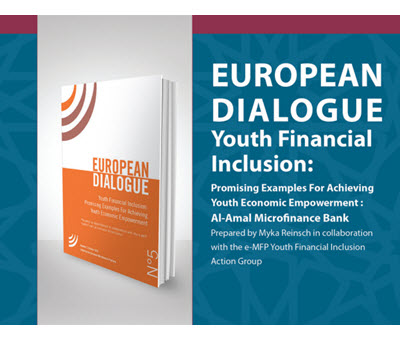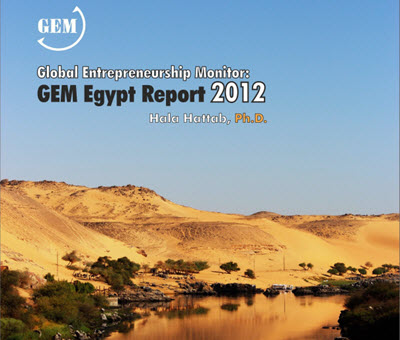-
The Labour Market For Youth In Egypt: Evidence From The 2012 School To Work Transition Survey
Dec 30, 2014This paper presents an analysis of data from the ILO–Mastercard Foundation Work4Youth School to Work Transition Survey (SWTS) fielded in Egypt in November and December 2012. The Labour Market for Youth in Egypt: Evidence from the 2012 School to Work Transition Survey Working Paper 14-2 This study presents an analysis of data from the ILO–Mastercard Foundation Work4Youth School to Work Transition Survey (SWTS) fielded in Egypt in November and December 2012. The study was commissioned by Silatech with the intention of identifying issues from the SWTS data set that would be of relevance to policymaking relating to youth employment, and making suggestions for future empirical work.Read More -
Youth Transitions In Egypt: School, Work, And Family Formation In An Era Of Changing Opportunities
Oct 29, 2014This paper investigates how three transitions (education, employment, and family formation) into adulthood have been evolving over time in Egypt, and how the nature of youth transitions relates to gender, social class, and educational attainment. Youth Transitions in Egypt: School, Work, and Family Formation in an Era of Changing Opportunities Working Paper 14-1 Abstract Youth in Egypt hold rising aspirations for their adult lives, yet face an increasingly uncertain and protracted transition into adulthood. Entry into adulthood for Egyptian youth is based on three key life course transitions: education, employment, and family formation. This paper investigates how these inter-linked transitions have been evolving over time in Egypt and how the nature of youth transitions relates to gender, social class, and educational attainment. We demonstrate that there is a large divide in the life course of youth across education, employment, and marriage depending on their education and family background. Whether youth successfully make modern transitions, embark on such transitions and fail, or pursue a traditional route to adulthood depends on a complex interaction between their own educational attainment and the resources of their families. In light of these findings, we discuss the measures that can be used to assess youth transitions into adulthood, as well as the policies that can help facilitate successful transitions for struggling youth in Egypt.Read More -
The Egyptian Competitiveness Report 2013
Feb 26, 2014Produced by the Egyptian National Competitiveness Council and sponsored in part by Silatech, the ninth version of the Egyptian Competitiveness Report focuses on restructuring institutions in Egypt. Towards Sustainable Competitiveness: Restructuring Institutions in Egypt Chapter 1: Institutions for Enhanced Competitiveness in Egypt Chapter 2: Public Spending and Sustainable Competitiveness Chapter 3: Social Dialogue and Democratic Transition: The Role of Labor Market Institutions Chapter 4: Egyptian Tourism Competitiveness: A Strategic Vision for Economic and Social Success Chapter 5: An Overview of Institutional Aspects of Decentralized Territorial Governance in EgyptRead More -
IFAD Rural Youth Economic Empowerment Program
Oct 30, 2013This project overview explains the IFAD Rural Youth Economic Employment Program, which aims to increase the employment and self-employment of youth aged 15-35 in Morocco, Tunisia, Yemen and Egypt by 2016. Rural poverty is endemic in most of the Middle East and North African countries and youth are one of the groups that suffer most – unemployed rural youth have one of the highest incidences of poverty of all groups in MENA. There are many drivers for youth unemployment, including training and labor market mismatch, lack of social and business networks for youth, a bias toward government jobs over private sector jobs and self-employment, inadequate employability and entrepreneurship skills, and insufficient access to and use of appropriate financial services and capabilities. These last two constraints to successful employment – inadequate employability and entrepreneurial skills and insufficient access to and use of appropriate financial services and capabilities - are the focus of a partnership between Making Cents International, the International Fund for Agricultural Development (IFAD) and Silatech. Together, we will test innovative models in Morocco, Tunisia, Yemen and Egypt in the “IFAD Rural Youth Economic Empowerment Program” that have potential for scale up and sustainability. In the process, the program aims to increase the employment and self-employment of youth aged 15-35 by 2016.Read More -
Al-Amal EU Dialogue
Feb 28, 2013This publication is a set of examples of promising youth financial inclusion programs from around the world. It outlines and compares the lessons emerging from them. The purpose of this publication is to contribute to the microfinance sector’s collective knowledge base by sharing examples of promising youth financial inclusion programs around the world and the lessons emerging from them. By sharing case studies that illustrate a variety of service combinations, approaches and delivery models, the European Microfinance Platform (e-MFP) seeks to provide the reader with useful reference points for offering savings, credit and non-financial services (especially training and mentoring) to youth. The following examples have been selected not to make a case for a particular approach and not necessarily because the organizations have the right formula – in most cases the products and initiatives are too recent for conclusions to be drawn about their long-term sustainability and demonstrable impact on youth lives and livelihoods. But members of the e MFP Financial Inclusion Action Group believe these cases offer valuable lessons learned and experiences to consider as the practice of youth financial inclusion expands and evolves.Read More -
Global Entrepreneurship Monitor: GEM Egypt Report 2012
Dec 30, 2012Funded by Silatech, this report is the first study that captures the effect of the January 2011 revolution on entrepreneurship in the country using a nationally representative sample. Over the past few years, more attention has been paid to entrepreneurship in Egypt; for its vital role in job creation, opening up opportunities for youth, stimulating innovation and other aspects that contribute directly to the economic prosperity of the country. With this interest, it is anticipated that there are more Egyptians pursuing entrepreneurial opportunities and starting businesses. However, Egyptian entrepreneurs and business owners have faced many challenges over the last couple of years, mainly due to the Egyptian Revolution of 2011 that took place following a popular uprising that began on 25th of January 2011. Thus the 2012 GEM Study is important for Egypt for three key reasons: It is the first study that captures the effect of the 25th of January, 2011 revolution on entrepreneurship in the country; using a nationally representative sample. It is the first study at its level that tackles the status of women in Egypt post revolution. It is the 3rd cycle after 2010 and 2008, enabling emerging trends to be identified. This work was carried out with the aid of a grant from the International Development Research Centre (Ottawa, Canada) and Silatech. The full report can be accessed here.Read More

